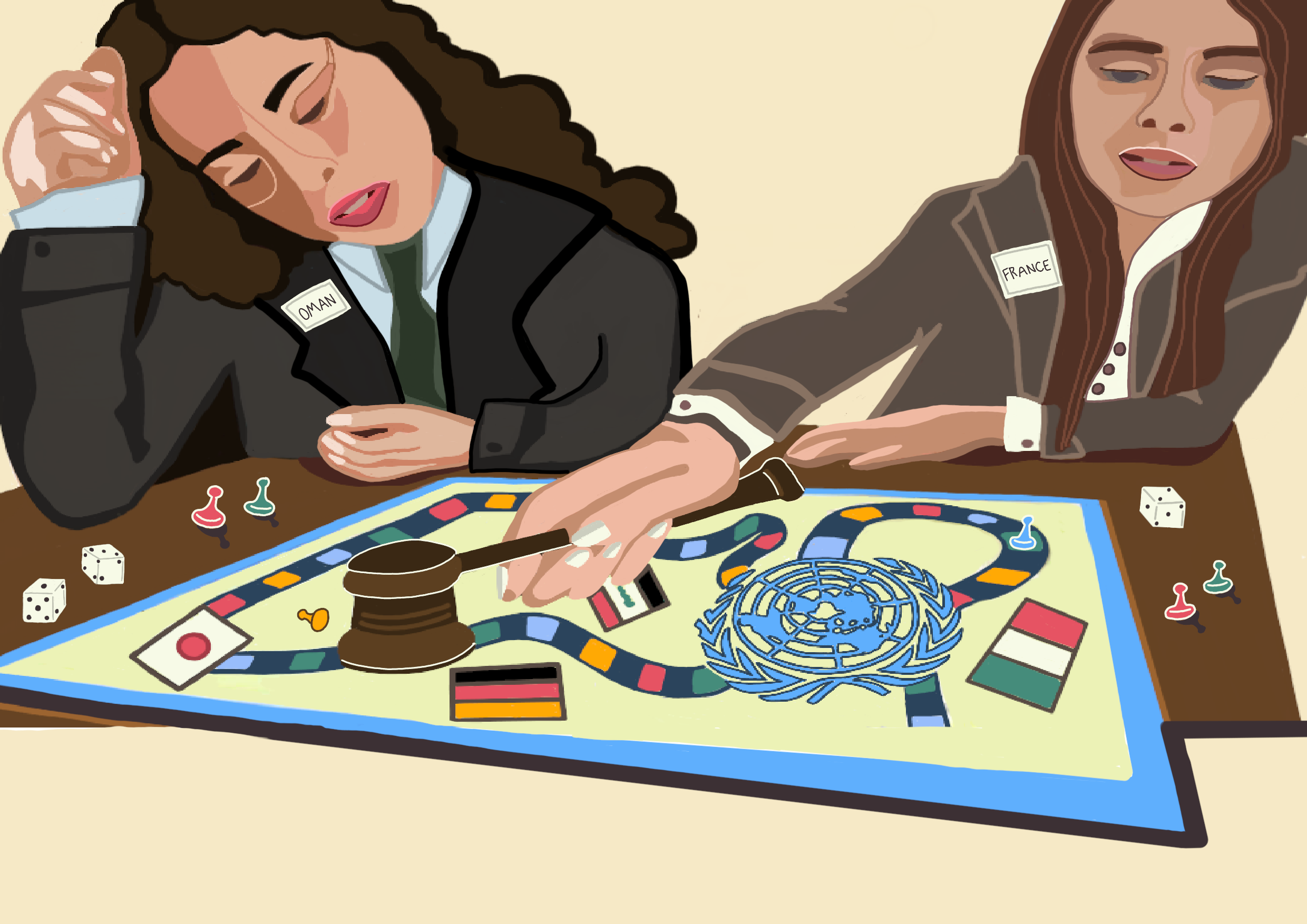Model United Nations (UN) seems to be integrated into the personality of the archetypal Georgetown student: preppy, privileged, and blazer-clad. Its widespread popularity has lended it some immunity to criticism of its severe shortfalls, educationally or otherwise.
Intended as a simulation of the UN, participants of Model UN step into the shoes of ambassadors from member states, engaging in rigorous debate to “solve” pressing global problems. As the basis of Model UN, roleplay gives participants the opportunity to dabble in diplomacy in a safe learning environment.
There is nothing inherently wrong with roleplay, but context is critical: Here, the stage is an intergovernmental organization and the storylines are often crises that concern real people. In embodying their roles as ambassadors, participants may neglect the actual stakes—lives and livelihoods—that cannot be replicated in a mere simulation. Representing a country comes with responsibilities that faraway participants, no matter how well-informed, cannot possibly comprehend.
Yet while participants are spared from the burden of real leadership, they are offered a taste of the unbridled power that their position entails. The gravity of the topics—ranging from poverty to persecution—is often lost in the frivolity in which they are discussed, whether it is throwing imaginary sums of money at climate disasters or volunteering dizzying numbers of peacekeepers to conflict regions. It is unsurprising that many serious discussions devolve into cataclysmic scenarios, such as deploying nuclear weapons or carving out new republics entirely. Both of these scenarios have admittedly happened in the past century—under extraordinary circumstances. But in Model UN, it isn’t uncommon for participants to turn to dramatically inappropriate measures—such as establishing organizations with crude acronyms or teaming up to nuke another country—for the sole purpose of entertainment or “getting something done.”
This has dangerous implications—both for the participants of Model UN as well as broader politics. Roleplaying an ambassador can feel empowering. But when participants are allowed to debate issues by which they (more often than not) aren’t directly affected, Model UN fosters the mindset that actions have no ramifications. Contrary to one of its goals to cultivate empathy, Model UN inculcates within participants the mentality that the world can be their playground and that people can be their pawns. Surely, this isn’t the mentality we would want any of our future leaders to have.
The danger of this mentality is only compounded by organizational elitism. Financially, Model UN has high barriers: Conferences, along with their subsequent socials, are typically expensive. Not every school has the resources to fund trainings, much less a traveling team. As a result, participants of Model UN tend to hail from wealthy private schools. This is antithetical to its purported mission to build a more just and equitable world; it is ironic that Model UN should be so oblivious to its own structural inequities.
Strict expectations for participants to don Western business attire and converse in legislative language may make conferences more similar to UN chambers, but also create the impression that appearances precede substance. It is frequently these superficial aspects of Model UN that detract attention away from its more meaningful learning objectives, turning it into a pretentious pseudo-intellectual activity.
The performativity of Model UN culminates in the presentation of “Best Delegate” awards. This incentive structure is problematic; crucially, sophistication and nuance in debate are rarely rewarded. For the most part, the criteria for these awards are hazily defined, much less standardized—leaving it up to participants to resort to an arbitrary variety of external metrics to prove themselves to moderators (or “chairs”), who unilaterally decide on the outcome. Based on my experience, awards are usually handed out to the most obnoxious delegates: the ones who dominate the floor, flaunt the most impressive words, and list the most number of NGOs in their resolution, often talking down to others in the process. This promotes the misperception that the way for participants to become “good” at diplomacy is to occupy the most space.
Furthermore, this practice suggests that there is a “winner” in international relations in the first place. Instead of stimulating cooperation, this environment encourages participants to strive for recognition, often at the expense of others, reifying the notion that international relations is a zero-sum game. As a start, eliminating awards in Model UN can combat these mindsets, and thus recenter debate around more substantive points.
But Model UN isn’t without hope; the solution to these criticisms doesn’t have to be as radical as abolishing Model UN. Rather, the easiest change that Model UN can make is to stop taking itself so seriously. The primary issue with Model UN isn’t that it is roleplay; it is that it forgets that it is just roleplay. While there is undeniable merit in mimicking the UN, it can be far too easy to slip into the narrative that what is fundamentally just an interesting extracurricular is equivalent to solving global problems. It doesn’t help that Model UN conferences frequently frame participants as “future leaders of the world,” conferring participants with an inflated sense of self-importance and simultaneously making diplomatic processes feel easy and costless.
Doing away with its elements of performativity can instill within participants an attitude of humility, reminding them that they are ultimately just students in a simulation. This also serves the purpose of increasing accessibility: Easing rules for how to dress and speak can dispel the air of elitism around Model UN, and thus appeal to historically excluded students. In addition, organizers can invest more resources for low-income students and students of color to attend conferences.
Perhaps these reforms would make Model UN a less realistic take on the UN. Nevertheless, it is key to bear in mind that the UN has a less than admirable track record in regard to effectiveness—its operations have long been impeded by lofty ideals and hollow rhetoric. In that case, we ought to consider if the UN is worth modeling after at all, or if we might be better off reimagining what it could be. The latter, I believe, is more compelling.






